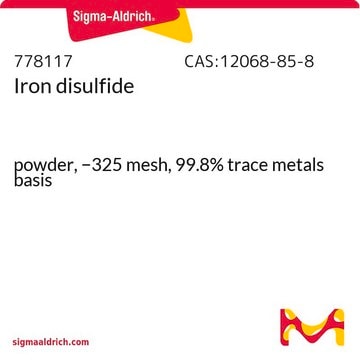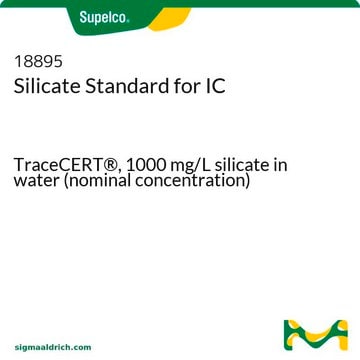268704
Iron(II) sulfide
technical grade
Synonym(s):
Ferrous sulfide
Sign Into View Organizational & Contract Pricing
All Photos(2)
About This Item
Empirical Formula (Hill Notation):
FeS
CAS Number:
Molecular Weight:
87.91
EC Number:
MDL number:
UNSPSC Code:
12352302
PubChem Substance ID:
NACRES:
NA.55
Recommended Products
grade
technical grade
form
powder or chunks
concentration
60.0-72.0% Fe (titration)
density
4.84 g/mL at 25 °C (lit.)
SMILES string
S=[Fe]
InChI
1S/Fe.S
InChI key
MBMLMWLHJBBADN-UHFFFAOYSA-N
Looking for similar products? Visit Product Comparison Guide
Features and Benefits
Non-stoichiometric, inhomogeneous product
Storage Class Code
11 - Combustible Solids
WGK
WGK 3
Flash Point(F)
Not applicable
Flash Point(C)
Not applicable
Certificates of Analysis (COA)
Search for Certificates of Analysis (COA) by entering the products Lot/Batch Number. Lot and Batch Numbers can be found on a product’s label following the words ‘Lot’ or ‘Batch’.
Already Own This Product?
Find documentation for the products that you have recently purchased in the Document Library.
Customers Also Viewed
Bo Zhang et al.
Proceedings of the National Academy of Sciences of the United States of America, 109(39), 15734-15739 (2012-09-29)
Fumarate and nitrate reduction (FNR) regulatory proteins are O(2)-sensing bacterial transcription factors that control the switch between aerobic and anaerobic metabolism. Under anaerobic conditions [4Fe-4S](2+)-FNR exists as a DNA-binding homodimer. In response to elevated oxygen levels, the [4Fe-4S](2+) cluster undergoes
Elvira Bura-Nakić et al.
Environmental science & technology, 47(2), 741-749 (2012-12-18)
Recent publications have shown that the anodic reaction between FeS and Hg can be used for electrochemical detection of colloidal and particulate FeS in natural waters. Anodic waves that were recorded around -0.45 V (vs Ag/AgCl) in model solutions correspond
Bin Huang et al.
Bioresource technology, 102(21), 10154-10157 (2011-09-07)
The performance of acetic acid-supported pH-heterogenized heterotrophic denitrification (HD) facilitated with ferrous sulfide-based autotrophic denitrification (AD) was investigated in upflow activated carbon-packed column reactors for reliable removal of highly elevated nitrate (42 mg NO(3)-Nl(-1)) in drinking water. The use of
Dong Suk Han et al.
Journal of hazardous materials, 186(1), 451-457 (2010-11-30)
Higher concentrations (127, 253 μM) of Se(IV) at pH 8 were completely removed by 0.5 g/L FeS within 120 min. Removal of Se(VI) by FeS at pH 8 was less extensive than removal of Se(IV). Only 10% of the Se(VI)
Eun-Ju Kim et al.
ACS applied materials & interfaces, 3(5), 1457-1462 (2011-04-28)
Multicomponent nanoparticles containing two or more different types of functionalities show unique physical and chemical properties, leading to significantly enhanced performance. In this study, we have developed a new one-pot method to prepare Fe/FeS nanoparticles using dithionite at room temperature.
Our team of scientists has experience in all areas of research including Life Science, Material Science, Chemical Synthesis, Chromatography, Analytical and many others.
Contact Technical Service














